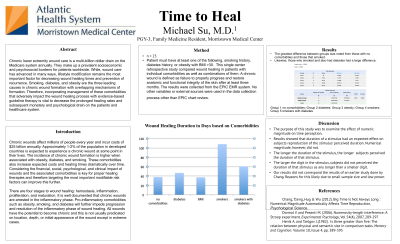Clinical: Outcomes Studies
Time to Heal: Wound Healing Rates in the Setting of Smoking, Diabetes, and Obesity
Friday, March 31, 2023
12:00 PM East Coast USA Time

- MS
Michael Su, MD (he/him/his)
Family Medicine Resident
Atlantic Health Systems
Wharton, New Jersey, United States
Presenting Author(s)
Background and Hypothesis:
Background: Approximately 1-2% of the developed world experience a chronic wound at some point in their lives. The comorbidities of obesity, diabetes, and smoking also increase expected costs and healing times dramatically over time.
Hypothesis: Patients with diabetes, obesity, and/or a smoking history will have prolonged wound care healing compared to those that do not, mitigated by severity and presence of multiple conditions.
Methods:
Method:
Methods: For this single center retrospective study, 25 patients were selected from the Morristown Center for Wound Healing. Criteria for selection was having at least 1 chronic lower extremity wound. Patient must have at least one of the following, smoking history, diabetes history, or obesity with BMI >30. The results were collected from the EPIC EMR system.
Results:
Results: In this study it was found that diabetes and obesity significantly increased wound healing times [average 46.7 days for diabetics versus 107 for non-diabetics; average 37.3 days for the obese versus 102.7 days for the non-obese]. It is also evident that diabetes in combination with obesity is also a significant risk factor as would be expected.
Conclusion:
Conclusion: This study demonstrates that wound healing was negatively impacted by having either diabetes, obesity, or a smoking history. As expected, the presence of multiple of this conditions worsened wound healing. Further, the severity of the condition also led to protracted healing times. Thus, prevention and management of these conditions will decrease healing times and ensure healthier outcomes.
Acknowledgement of Research Study Sponsors and IRB: Acknowledgement: The authors thank Morristown Medical Center Family Medicine and Dr. Skerker of the Morristown Center for Wound Healing for their support.
Background: Approximately 1-2% of the developed world experience a chronic wound at some point in their lives. The comorbidities of obesity, diabetes, and smoking also increase expected costs and healing times dramatically over time.
Hypothesis: Patients with diabetes, obesity, and/or a smoking history will have prolonged wound care healing compared to those that do not, mitigated by severity and presence of multiple conditions.
Methods:
Method:
Methods: For this single center retrospective study, 25 patients were selected from the Morristown Center for Wound Healing. Criteria for selection was having at least 1 chronic lower extremity wound. Patient must have at least one of the following, smoking history, diabetes history, or obesity with BMI >30. The results were collected from the EPIC EMR system.
Results:
Results: In this study it was found that diabetes and obesity significantly increased wound healing times [average 46.7 days for diabetics versus 107 for non-diabetics; average 37.3 days for the obese versus 102.7 days for the non-obese]. It is also evident that diabetes in combination with obesity is also a significant risk factor as would be expected.
Conclusion:
Conclusion: This study demonstrates that wound healing was negatively impacted by having either diabetes, obesity, or a smoking history. As expected, the presence of multiple of this conditions worsened wound healing. Further, the severity of the condition also led to protracted healing times. Thus, prevention and management of these conditions will decrease healing times and ensure healthier outcomes.
Acknowledgement of Research Study Sponsors and IRB: Acknowledgement: The authors thank Morristown Medical Center Family Medicine and Dr. Skerker of the Morristown Center for Wound Healing for their support.
